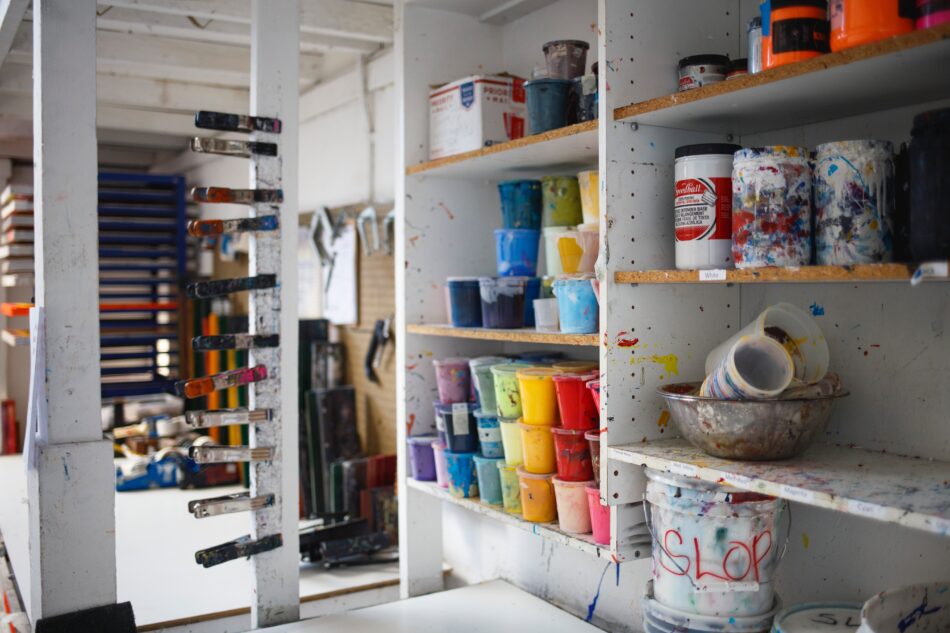Prepare Your Business for New Food Waste Legislation in the UK
From 31 March 2025, most UK businesses must arrange separate food waste collections. Learn and prepare for the new food waste legislation in the UK.

Most UK homeowners will find a few half-used cans of paint in their sheds, garages, or store cupboards. You’re unlikely to open most of these again, instead preparing to throw them away. But knowing how to dispose of paint cans and tins can be confusing as waste paint disposal isn’t the most straightforward thing.
Correct disposal of paint, cans, and tins is important to protect human and environmental health. Ensure you get rid of any paint safely and legally to free up some storage space. Use this guide to learn more about disposing of and recycling paint tins from your home or business.
Paint itself dates back more than 100,000 years, so it’s hard to say who exactly invented paint as a material and concept. The earliest example of paint making was discovered in South Africa, where various mineral and organic-based pigments were excavated. This paint was made from red iron oxide and charcoal to create a burgundy shade and it was mixed with bone marrow, used as a binding agent.
Paint cans were invented much more recently. US company Sherwin-Williams patented the first resealable tin paint can in 1877. Before this, any leftover paint was simply thrown away. Aerosol paint cans are an even more recent invention, invented by Edward Seymour in 1949.
Paint is made of four key elements – pigment, solvent, resin, and additives. These vary between oil, water, or acrylic-based paints. Both water and oil-base paint class as hazardous waste as they contain components that could potentially harm human health or the environment through improper paint disposal.
The general process to make paint follows these steps:
There are two main types of paint cans, made from either plastic or metal. The more recently developed plastic cans are constructed from high-density polyethylene (HDPE). Metal cans are made from tin-plated steel. The tin plating is for corrosion resistance and the steel can be repeatedly recycled.
Empty and clean paint cans can therefore class as a type of plastic waste or a form of metal waste.
The best way to dispose of paint is to donate it. Ask your friends, family, and colleagues if they could make use of any leftover paint you have. You can also try donating paint to your local community centre, school, library, or council.
If you can’t donate it, there are other options for disposing of paint. Liquid paint is banned from landfills and will not be accepted by your local council. You must wait for it to harden – this can be sped up by adding sawdust, soil, or sand. Do this if there’s more than a few centimetres of pint left in the can.
Then, take it to your local household waste and recycling centre. Here they’ll recycle your paint cans and dispose of any paint left in them responsibly. You should never pour paint down the drain as it can cause immense environmental problems for your local ecosystem and create hard-to-shift blockages that will obstruct your pipes.
Paint often comes under the banner of hazardous waste because it contains metallic pigments and fortifiers. These can cause breathing problems if inhaled. This can have damaging effects on children and older people, including liver issues and some cancers. Oil-based paint waste is especially problematic because it’s also flammable and often contains volatile organic compounds.
Improper disposal of paint tins and cans can mean they end up in landfill, where such hazardous elements can leach into the surrounding soil and water putting human and environmental health at risk. This is why recycling paint cans and disposing of any waste paint responsibly is so important.
It’s always better to opt for metal paint cans where possible as they’re easier to dispose of and are widely recycled compared to plastic paint cans. Recycling paint tins made of metal means you’ll contribute less to landfill and environmental pollution.
For paint, you can get creative with alternatives. Wallpaper is one substitute when decorating interior walls but there are more. Consider experimenting with drapes and tapestries, decals and art, flowers and garlands for a living wall, or even bare brick or stone.
These are a few interesting facts about paint:
You can take paint cans and tins to your local household recycling and waste collection point for free. Add a bit of sawdust, soil, or sand to soak up any remaining paint and help the recycling process. It’s always better to dispose of paint and paint cans responsibly to save yourself from legal, environmental, or health concerns.
For businesses, you need to arrange collection by licensed waste carriers when getting rid of paint tins – which comes at a small cost. This is a legal requirement and ensures your company operates within the law when disposing of paint cans. Contact us today for a free quote.
Find out more about other rubbish streams.
Get a fast FREE quote for your paint waste
From 31 March 2025, most UK businesses must arrange separate food waste collections. Learn and prepare for the new food waste legislation in the UK.
The study participants included business owners and company employees, revealing unexpected findings about corporate environmental practices.